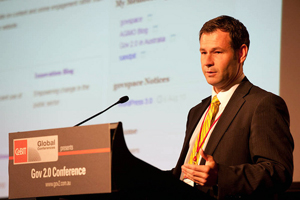Gov 2.0 Twitter hiccups inevitable: AGIMO

Controversial, high profile incidents involving public servants blogging or using Twitter are just part of the learning process of open government, or Government 2.0, according to Australian Government Information Management Office's (AGIMO's) online services branch assistant secretary Peter Alexander.

Peter Alexander speaking at the CeBIT Gov 2.0 forum in Canberra (Credit: CeBIT)
Part of Alexander's role within the AGIMO branch is to develop and manage web policy that is often adapted and used by other government agencies. Alexander's own tweets were criticised by Liberal Senator Cory Bernardi in Senate Estimates and The Australian recently outed anonymous political blogger Grog's Gamut as Department of Environment, Heritage and the Arts public servant Greg Jericho. According to Alexander, such events were just part of the learning experience.
"Grog's Gamut, the examples in the UK and the US of similar issues, are boundaries being pushed or broken. These are part of the learning process that we're going through to understand how we deal with these things more effectively," Alexander told ZDNet Australia. "But I think the fundamental is [that] Gov 2.0 is a real force for good and the more open and engaged we can be is a good thing."
Alexander said that the policy surrounding public servants engaging in discussion online is broken into three areas.
"The Gov 2.0 taskforce addressed this quite well in its paper and talked about three types of engagement for an individual: official — where you'll be clearly recognisable as a public official from an agency; ... private — engaging as a private individual;[and in] the middle there's the professional capacity where as I as a professional or an accountant might engage in a discussion in a professional capacity."
In engaging in political discussion anonymously online, Grog's Gamut would not have been in breach of the guidelines. Alexander said that his own tweets were somewhere between official and private, mentioning he would often tweet about going for a run.
In Estimates, Bernardi was critical of tweets where Alexander had said he had wrapped up a "TF meeting". Bernardi questioned whether this was appropriate if it was a confidential meeting. In his tweets Alexander was referring to the meetings of the Gov 2.0 Taskforce (TF).
Alexander said that methods of communicating with people might be different with the availability of new technology, but that ultimately the intent was the same.
"Some people will go too far, no doubt, but is that related to Gov 2.0 technology or is that more related to any type of application they might have?" he asked. "If someone wanted to leak something, would they send it via another channel? It's broadcast more broadly if it's on Twitter or a blog that lots of people follow, but the fundamental intent is still the same.
"If someone's intending to release material or have a discussion with the intent of building knowledge or sharing something that's appropriate — that's good. If people are doing things that are inappropriate — that's bad. Regardless, if they're using Web 2.0 or some other channel, they're breaching the public service code of conduct and it should be dealt with."
Changing people's perceptions of the traditional closed nature of the public service was the real challenge of Gov 2.0, Alexander said.
"The biggest challenge in Gov 2.0 isn't technology and it isn't releasing data sets technically, it is that culture leadership issue and it is changing the approach people take. The open government agenda is new. There is a cultural change that needs to take place and an education process for people to see how that's happening," he said.
"I think the Gov 2.0 agenda has been at the forefront of making that happen by people releasing datasets, engaging the community on blogs and using Twitter to discuss and resolve issues."
Alexander spoke this week at the CeBIT Gov 2.0 forum in Canberra. His presentation from the event can be viewed here.